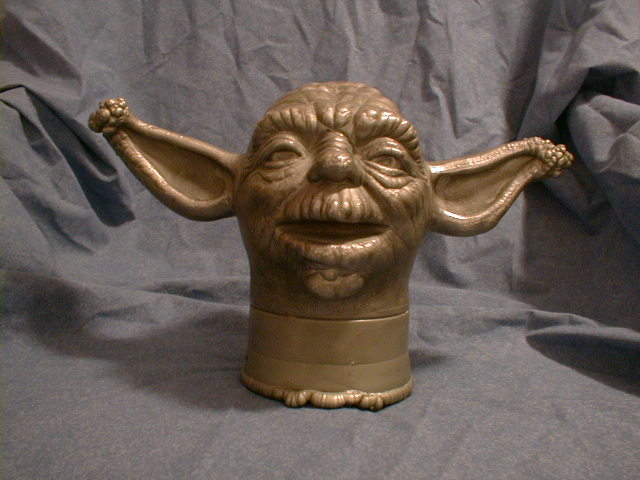

Electroform Mold for Conceptual Talking Yoda Head: Look a little weird? Like some sort of sick, Star Wars-themed voodoo totem, maybe? Well, not exactly. What this is is an actual metal mold used for producing rubber Talking Yoda heads, much like the one seen here. The creation of a mold like this would have started with a wax sculpting, made to include all the details desired on the final production piece. That sculpting would then be coated with some type of material capable of conducting electricity and placed in a special bath.

Although I don't understand the process entirely, I believe the bath is electrically charged. Then, over a period of several days, particles of metal slowly build up over the surface of the coated wax sculpting. You'll notice the odd broccoli-like configuration on the tips of the ears. This is simply due to a greater amount of metal having built up around these extremities.

This ear build-up is inconsequential, however, since its the inside of the mold which is responsible for creating the detail on the finished pieces. When a sufficient amount of metal has built up around the surface of the sculpting, the entire metal-coated head is removed from the bath. It is then heated so as to cause the wax sculpting inside to melt and drip out of the bottom. (I know, I know--its a killer thinking of that sculpting being destroyed). The final product would be the hollow mold you see here.
Molds such as this would have been used to cast hollow rubber pieces through a process commonly called "roto-casting." Basically, a fluid rubber material which hardens with heat is poured into the mold. The mold is continually spun so as to cause the rubber to build up and harden solely along the walls of the mold's interior. In other wods, the center portion is left hollow. Then, to remove the final rubber casting, a vacuum device is used to suck the air out of the bottom of the mold, thereby causing the hollow rubber piece to collapse, at which point it can be pulled easily out of the bottom of the mold.
Many toys are produced in this manner. The Kenner Yoda Hand Puppet, for instance, would have been roto-cast, as would have been the hollow rubber heads used on many of Kenner's 12" Star Wars dolls. The process must have been relatively inexpensive, for Kenner appears to have used it for applications which were entirely conceptual in nature. The roto-cast products of Yoda molds such as the one you see here, for instance, were obviously never intended for the shelves of retail stores. They are, however, known to have been used on early conceptual dolls, which don't appear to have been planned for release.
Description: Ron Salvatore